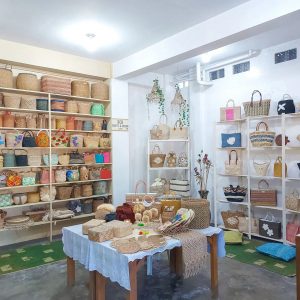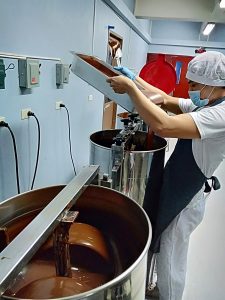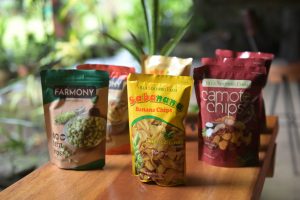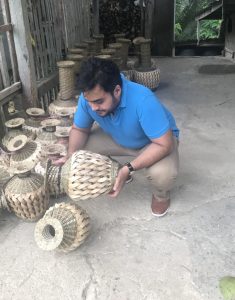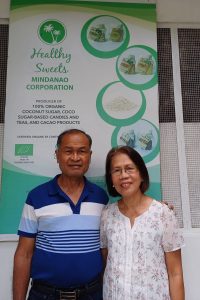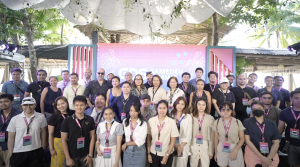A tale of vision, resilience, and unwavering commitment to the Pinoy legacy.
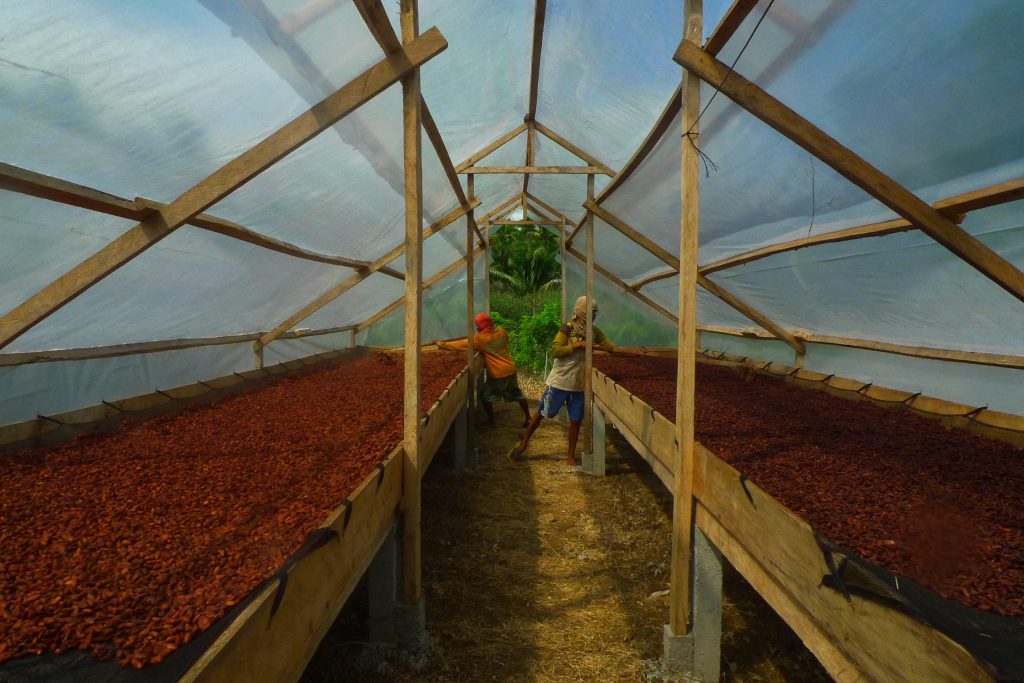
A diamond in the rough
Amid the idyllic backdrop of Davao del Norte’s hinterlands, a tale of chocolate unfolds.
In a time when roads remained unpaved, and the journey from bustling Davao City to the tranquil haven of San Isidro demanded hours of travel, the Department of Trade and Industry (DTI) Davao del Norte, and entrepreneur Theodore Garcia of CSI Trade Ventures saw beyond the rugged terrain.
They glimpsed the potential within the cacao crops that flourished in this agreeable climate.
Back then, 4,000 hectares in the province of Davao del Norte bore the promise of cacao. However, challenges loomed large. Political unrest, pest infestations, and the absence of centralized quality controls cast shadows on cacao farming in the 1990s. A lot of cacao plantations in Davao Region changed to other crops or were abandoned, yet one town refused to relinquish its cacao dreams—San Isidro.
Proudly, Chokolate de San Isidro’s Marketing Director, Toto Muyco states, “San Isidro is the town that Cacao built,” a testament to the indomitable spirit of its people. To safeguard this legacy, Mr. Garcia, alongside business partners and the townspeople of the municipality, pooled their resources. They ventured to produce cacao beans and chocolates, embarking on journeys to Davao City and Metro Manila to introduce their creations.
Starting small with an attention to quality
Their relentless efforts led them to knock on every door, seeking investors. With an initial investment of approximately Php 300,000, they secured produce from farmers at fair prices, ensuring the lion’s share reached those who toiled the land.
Muyco underscores the commitment to quality standards—meticulous care in selecting seedlings, utilizing fertilizers, and ensuring ethical labor practices and free from child labor.
DTI and CSI Trade Ventures rallied cacao cooperatives to take part in forming Chokolate de San Isidro, Inc., with the idea of a collective production and processing system, to foster economies of scale.
Product is key
“The Philippines’ cacao beans have consistently ranked among the world’s top 50 since 2017. While production volumes remain a challenge, the exceptional quality of our beans has carved out a niche in the global market,” notes Muyco, also serving as Chairperson of the Davao Region Cacao Industry council.
Others have also been endorsing the company’s products.
In 2021, Chokolate de San Isidro was awarded the Silver Award by the prestigious Cocoa of Excellence Awards in Europe as their bean entry entered the Top 50 Best Beans in the World. This is participated in by more than 50 cacao producing countries and having more than 220 entries worldwide.
Describing the flavor profile of San Isidro’s beans, Cacao of Excellence noted, “Very pleasant, fruity, and balanced cocoa. It first shows fresh fruits, followed by browned fruits. The finish is raisins and plums, with spices (black pepper) over a backdrop of balanced core attributes. Nut and nut skins, floral and caramel notes. Surprisingly fruity acidity. The core of this cocoa is so well-balanced that it supports perfectly the beautiful fruity aromas. Exhibits complexity.”
The Cocoa of Excellence is led by the Alliance of Bioversity International and the Center Internationale Agriculture Tropicale (CIAT), affiliated with the Consultative Group on International Agricultural Research (CGIAR).
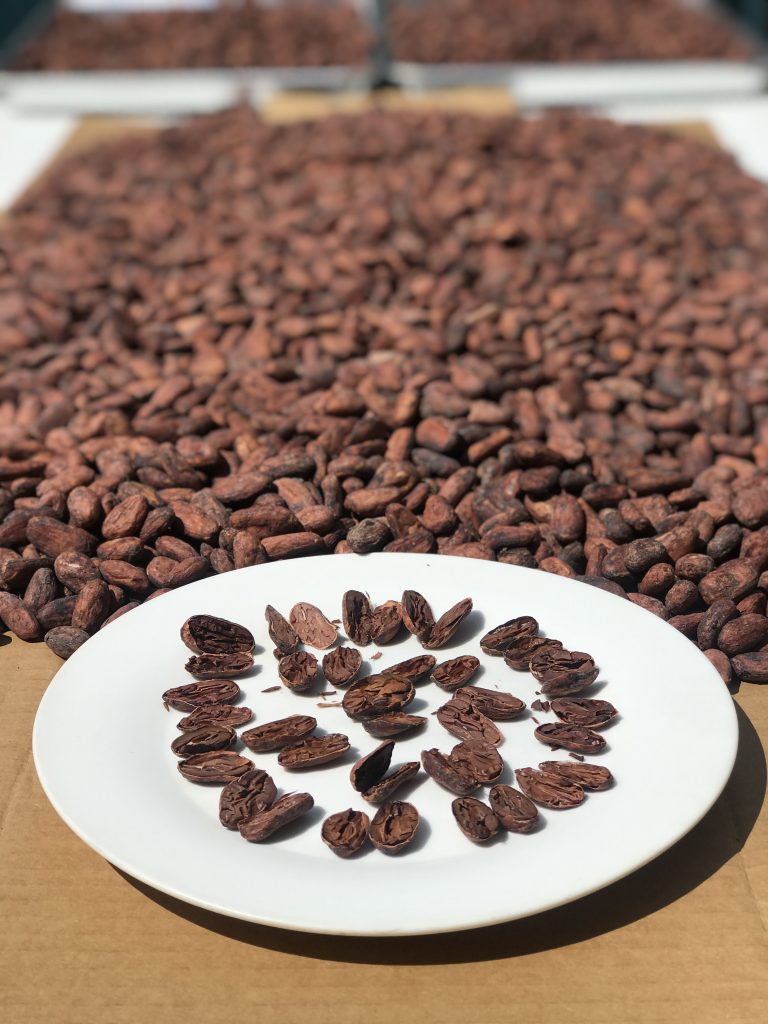
Support from the Department of Trade and Industry (DTI)
In 2006, the Philippines government’s Department of Trade and Industry (DTI) initiated the One Town-One Product (OTOP) Project, designating cacao for San Isidro and envisioning the birth of Chokolate de San Isidro.
Muyco recalls how the DTI recognized their enterprise as an inclusive business, an embodiment of a social enterprise where all stakeholders along the value chain could actively participate. Today, Chokolate de San Isidro Inc. stands registered with investors hailing from Davao and Tagum Cities, six farmers’ cooperatives across Mamangan, Linao, San Miguel, Dacudao, Mabuhay, and Igangon, and local investors coming from the municipality of San Isidro.
In 2008, the pursuit of the perfect cocoa liquor (known as tablea in Filipino) witnessed a unique competition among San Isidro’s residents. Emma Cuyos’s creation, inspired by a century-old family tradition from Cebu, emerged victorious. Today, Cuyos leads the production of the renowned Chokolate de San Isidro Sikwate!. The factory, predominantly staffed by women, started producing 10 kilos of cocoa liquor and over time expanded to more than 10 tons of tablea per month, serving popular brands in Metro Manila such as Chocolat Cakes (of the famed ‘Death by Tablea’ Cake).
The company’s operations span the entire cacao value chain, from nursery and seedling production to cacao beans consolidation, fermentation, drying, and trading.
Entering the European market sustainably
Chokolate de San Isidro is one of the pioneers in exporting cacao and commodity trading since 2009.
Muyco reflects on their groundbreaking efforts: “Exports of cacao beans from the Philippines on a commercial scale were pioneered by us in 2009, initially trading with the EU. We created an alternative market for local farmers and started offering better prices, which became a template in trading cacao from the farms, exporting to the Netherlands, Germany, and Belgium. And later, to Australia and Japan. Therefore, the development of an industry geared at improving farmers’ incomes can also be attributed to the existence of competition in trading and providing options for farmers in selling their products”, Muyco added.
Utilizing an integrated approach, CSI catalyzes the advancement of small-scale farmers, cooperatives, and enterprises within the cacao value chain.
“The beauty of the cacao industry lies in its decentralized nature. Unlike many other commodities, it’s not monopolized by a single entity. This fosters a sense of collective responsibility across the entire value chain, leading to inclusive growth from manufacturers, traders to farmers,” notes Muyco.
Focusing on growth
While the COVID-19 pandemic slowed exports in 2019, its marketing arm CSI Trade Ventures assumed responsibility for local product marketing, promoting domestic-led sales across Visayas and Luzon-based establishments. Their products also found a place on department store shelves, including SM’s Kultura shops.
This is the story of San Isidro, Davao del Norte, where the legacy of chocolate is etched in dedication, resilience, and a commitment to excellence. A tale where the humble cacao bean blossomed into an international sensation, all thanks to the relentless spirit of its custodians.
Muyco emphasizes the importance of ongoing efforts to ensure the industry’s prosperity.
“Improving traceability and sustainability systems is crucial for enhancing our brand reputation.” He underscores the significance of consolidating products from smallholder farmers to facilitate market linkages and reduce long-term logistics costs. “Collaboration is key to maximizing our potential and driving sustainable growth,” Muyco explains. ♦
The ARISE Plus Philippines project is enabling Philippine exporters to take advantage of European Union (EU) market access and the trade privileges granted under the Generalized System of Preference (GSP+). It supports the overall EU-Philippines trade relationship and trade-related policies.
ARISE Plus Philippines is a project of the Government of the Philippines, with the Department of Trade and Industry as lead partner together with the Department of Agriculture, Food and Drug Administration, Bureau of Customs, the Department of Science and Technology, as well as the private sector. It is funded by the EU with the International Trade Centre (ITC) as the technical agency for the project.
Date of release: 12 April 2024




